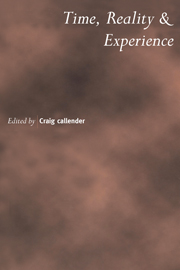Book contents
- Frontmatter
- Contents
- Preface
- Notes on Contributors
- When Time Gets Off Track
- Burbury's Last Case: The Mystery of the Entropic Arrow
- Zeno's Arrow and the Significance of the Present
- Presentism, Ontology and Temporal Experience
- A Presentist's Refutation of Mellor's McTaggart
- Time and Degrees of Existence: A Theory of ‘Degree Presentism’
- McTaggart and the Truth about Time
- On Absolute Becoming and the Myth of Passage
- Time Travel and Modern Physics
- Freedom from the Inside Out
- On Stages, Worms and Relativity
- On Becoming, Cosmic Time and Rotating Universes
- How Relativity Contradicts Presentism
- Can Physics Coherently Deny the Reality of Time?
- Rememberances, Mementos, and Time-Capsules
On Absolute Becoming and the Myth of Passage
Published online by Cambridge University Press: 05 May 2010
- Frontmatter
- Contents
- Preface
- Notes on Contributors
- When Time Gets Off Track
- Burbury's Last Case: The Mystery of the Entropic Arrow
- Zeno's Arrow and the Significance of the Present
- Presentism, Ontology and Temporal Experience
- A Presentist's Refutation of Mellor's McTaggart
- Time and Degrees of Existence: A Theory of ‘Degree Presentism’
- McTaggart and the Truth about Time
- On Absolute Becoming and the Myth of Passage
- Time Travel and Modern Physics
- Freedom from the Inside Out
- On Stages, Worms and Relativity
- On Becoming, Cosmic Time and Rotating Universes
- How Relativity Contradicts Presentism
- Can Physics Coherently Deny the Reality of Time?
- Rememberances, Mementos, and Time-Capsules
Summary
In the literature on time in the twentieth century stemming from J. M. E. McTaggart's famous argument for the unreality of time, two gems stand out. The first is C. D. Broad's patient dissection of McTaggart's argument in the chapter ‘Ostensible Temporality’ in his Examination of McTaggart's Philosophy. Broad carefully, and to my mind persuasively, uncovers the root errors in McTaggart's argument. In addition he tentatively proposes that the features of time that he calls its transitory aspect can be explained in terms of a dynamic aspect of time that he calls Absolute Becoming.
The second gem is D. C. Williams' paper, ‘The Myth of Passage,’ a gloriously over-written rant against the idea that there is something active or dynamic to time over and above ‘the spread of events in space-time’. Broad is mentioned thrice as a proponent of this myth. His contrast of the transitory aspect of time to its extensive aspect and his invocation of Absolute Becoming are mentioned in Williams' survey of attempts to characterize passage. (102–4) A few paragraphs later Broad is specifically mentioned, along with Bergson and Whitehead, as trying but failing to escape ‘the paradoxes of passage’. (106)
Broad clearly is on Williams' enemies list, and the general intent, as well as style, of Broad's chapter and Williams' paper could scarcely be more opposed. There is, nevertheless, an area of convergence, or even overlap, between the views of Broad and Williams that has not been remarked and that may help clarify the nature of passage.
- Type
- Chapter
- Information
- Time, Reality and Experience , pp. 153 - 168Publisher: Cambridge University PressPrint publication year: 2002
- 15
- Cited by

